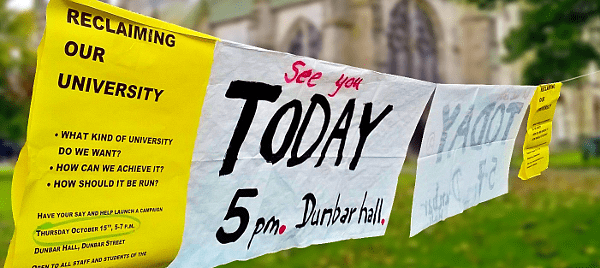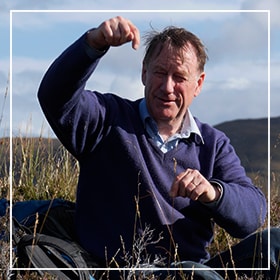Universities are in turmoil. There was a time when they stood out as pinnacles of Enlightenment, where scholarly elites could profess to a superior knowledge, based on reason and evidence, of the ways of the world. Their mission was to educate, to spread the light of learning to all nations, and to deliver their citizens from ignorance, poverty and subjugation. Chauvinistic they may have been, but these were progressive aspirations backed by a conviction of common human potential.
Like it or not, however, the Enlightenment programme has more or less collapsed, along with the powers that sustained it.
These were the historic powers of European-led colonisation, by which the allegedly superior ways of knowing of dominant nations were imposed upon subaltern populations. In our post-colonial world, the hierarchies of knowledge that once propped up the academy’s claim to superiority have crumbled. And as tends to happen at such moments, far from reaching an accommodation that would open up the correspondences of life to other ways of knowing and being, and to voices previously muted or suppressed, we are witnessing just the opposite, with the emergence on all sides of closed and self-righteous fundamentalisms, whether religious, political or economic. The world is becoming an increasingly dangerous place.
Beset by weak and compliant leadership, universities present soft targets for hostile takeover, whether by multinational corporations wedded to the doctrines of neoliberalism, by totalitarian regimes bent on the suppression of critical inquiry or by sectarian organisations aiming to spread their own particular versions of bigotry and intolerance. In this situation, it is imperative for universities to redefine their purpose. They can no longer take refuge behind self-serving appeals to academic immunity that have ceased to have any traction beyond their ivory towers, nor can they surrender to the profoundly anti-democratic forces that threaten their very existence. Fatuous mission statements merely paper over the abject failure of university leaders to address the question of what universities are for, with the depth and seriousness it deserves.
For in our present global predicament, universities do indeed have a new and critical role to play. It is to bring people of all ages together, across many forms of difference, and to establish an ecumenical environment in which these differences can be aired and debated in a spirit of tolerance, justice and common humanity.
Only by doing so can we begin to forge a world fit for coming generations to inhabit. No task is more important, and apart from universities, no other institutions currently exist to undertake it.
There is very little sign, however, that the regimes of management which have arrogated to themselves the business of controlling our universities have the slightest grasp of the issues at stake. Their myopic vision is circumscribed by crude indices of rank and productivity. We cannot wait for them to rise to a challenge they do not even recognise. Here at the University of Aberdeen, however, we have taken matters into our own hands by establishing an inclusive movement of scholars, students, staff and alumni under the banner ‘Reclaiming our University’. The movement was launched with an open meeting on October 15th, 2015. Throughout 2015-16 we held a series of seminars to debate what emerged from that meeting as the four pillars of the university:
freedom, trust, education and community.
How can we define academic freedom as a task freighted with responsibility, rather than a right that relieves us of it? How can trust carry the weight of expectation we place on staff and students? What is the meaning of ‘education’ in higher education, and does it mean the same as ‘teaching and learning’? How can we create a sense of community and common purpose across departments and disciplines whose interests and ways of working are so different? And above all, what is our University for, and to what ideals should it aspire?
All these discussions – sometimes heated, always constructive – eventually led us to draft a manifesto for ‘Reclaiming our University’, structured around these four pillars. Following a meeting on October 6th, 2016, the text of the manifesto has been finalised, and it is now being printed. You can read it here. The manifesto was recently launched at a public event on November 25th. Our purpose in writing it was not primarily to critique the existing state of affairs in the University. Everyone knows that it is going through bad times, and the reasons for this are well understood. We wanted to take a more constructive approach, namely, to set out a coherent vision for what our University could and should be. What we present in the manifesto, then, are a set of guiding principles. We are under no illusions. These principles are in many instances so much at variance with current orthodoxy that they may take years, if not decades, to implement. Nevertheless our aim is to have them adopted, by the Senate, as guidelines for the future development of the University. However long it takes to get there, we will at least have some directions to follow. And our hope is that if we can do it, then our colleagues in other institutions, even in other countries, will be inspired to follow suit.
Though ‘Reclaiming’ is for everyone, whatever their discipline, it is no accident that the movement took root in a department of anthropology, and that anthropologists have been at the forefront in taking it forward.
For despite its origins in the Enlightenment project and its early implication in regimes of colonial domination, no discipline has done more over the past several decades to expose the power relations that underpin traditional hierarchies of knowledge, or to question the claims of universal reason and empirical objectivity upon which they rest.
Indeed, in devoting so much of its energy to challenging the legitimacy of these hierarchies, and to demonstrating the force and integrity of ways of knowing rooted in diverse practices of ordinary life, anthropology has showed its capacity to be the most virulently anti-academic of academic disciplines. Yet for the most part, anthropologists remain tied to an academic model of knowledge production according to which lessons learned in the field, through observation and practical participation, are recast as data for ethnographic analysis. For the discipline to realise its true emancipatory potential we need to take one further step, beyond ethnography, to recognise that anthropology is not so much the study of others as a way of studying with them, in order that together, we can better explore the conditions and possibilities of life (and not just human life) in the one world we all inhabit.
No one can doubt that the organisations of production, distribution, governance and knowledge that have dominated the modern era have brought the world to the brink of catastrophe. In finding ways to carry on, we need all the help we can get. Whether we agree with them or not, we cannot afford to turn a deaf ear to what others have to tell us, whatever their profession, creed or walk of life. Nor is it enough just to understand or interpret what they have to say, by embedding it in its social, cultural or historical context. We must bring others into our presence so that we can learn from them, argue with them and debate with them, just as they can learn from, argue and debate with us. That’s the way to forge a common future. But this, too, is surely the way of the coming university: to bring people together and debate their differences in a spirit of tolerance and inclusiveness.
The future for anthropology, in short, is nothing less than the future for the university.
What we want for the university is what we want for anthropology, and our discipline will be at the heart of it. No other discipline in the academic pantheon is better placed to point the way toward a sustainable world that will have a place for everyone. But unless we reform the university, and with it the discipline of anthropology, both will sink together, along with the manifestly unsustainable world order to which they currently belong.
Featured image (cropped) by Gordon Robertson (flickr, CC BY 2.0)







This needs to be circulated extremely widely. To move from a study of others, to a study with them and not of them.
Agreed. Have been saying and doing so, in collaborative research with (not on) people in China and Japan. Vide my plenary talk at Musee Quai Branly last May.
Nelson Graburn
U C Berkeley, Anthropology and TSWG